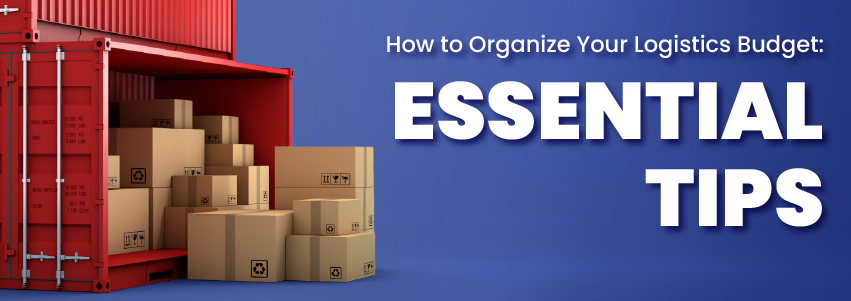How to Organize Your Logistics Budget: Essential Tips
Table of Contents
Reliable and reasonably priced supply chain management depends mostly on excellent logistics budgeting. Knowing how to manage, allocate, and maximize your logistics expenses will help your company remain competitive and financially strong whether you run a small operation or handle complicated worldwide shipments.
In this blog, we explore what a logistics budget is, why budgeting is crucial in logistics, and step-by-step guidance on how to create an effective budget. We also discuss key factors that influence logistics costs, smart cost-saving strategies, the role of technology in budget optimization, and how collaborating with a trusted network like OPCA can support your financial planning in global logistics.
What is a Logistics Budget?
From sourcing and packing to transportation and delivery, logistics budget meaning is the thorough estimate and allocation of all the expenses engaged in the supply chain operation. A well-defined logistics budget guarantees effective operations even with transport on budget limitations, helps companies stay organized, avoids financial errors, and guarantees their organization.
A well-organized logistics budget offers a clear road map for handling supply chain expenditure of financial resources. Forecasting expenses, including transportation, storage, customs taxes, and other logistics-related costs, is part of it. A logistics budget's major goal is to maximize expenditure while yet preserving operational effectiveness and service quality. Effective budget planning by companies helps them to control financial risks and maintain long-term profitability.
What is the Importance of Budgeting in Logistics?
Budgeting in logistics is crucial for controlling running expenses and guarantees of profitability. A well-planned budget benefits companies in several ways: it allows them to maximize transportation costs, it lowers unanticipated expenses, it improves cash flow management, and it guarantees regulatory compliance.
Proper logistics budgeting helps managers to project their budgetary requirements and distribute their resources. It also points out ways to cut costs, such as supply chain operations optimization, better freight rate negotiation, and shipment consolidation. Companies that neglect effective budgeting could find their logistics operations disrupted, their finances unstable, or delays.
Steps to Create an Effective Logistics Budget
Creating a thorough logistics budget requires meticulous preparation and careful assessment of several elements. Here are important guidelines for building a sensible budget for logistics:
- Assess Your Current Logistics Costs: Start by looking at your current logistics spending—including transportation, storage space, insurance, customs taxes, and other relevant expenses. Examining prior spending helps one to see trends and areas in which cost control is feasible.
- Forecast Future Demand and Costs: Budgeting in logistics depends on an awareness of future transportation needs. To project future spending, examine demand predictions, market trends, and historical data. Think about possible changes in shipping rates, fuel prices, and the world economic situation that can influence logistics expenses.
- Allocate Funds for Different Logistics Activities: Classify your logistics budget among areas including transportation, storage, labor, customs clearance, and insurance. Allocate money depending on the value of every category to your supply chain processes.
- Monitor and Adjust the Budget: A logistics budget needs to be flexible and dynamic enough to fit new conditions. Monitor spending often and change the budget as necessary to fit changes in demand, gasoline costs, and other factors.
- Utilize Cost-Saving Strategies: Use tactics like reasonably priced transportation to keep your logistics within your budget. You can achieve this by negotiating bulk shipping rates, optimizing warehouse locations, lowering storage costs through effective inventory control, and utilizing technology to enhance supply chain visibility.
What Else Can Affect the Logistics Budget?
Many elements affect budgeting for logistics. Knowing these components will enable companies to create more coherent plans:
Base Freight Rates
Demand, distance, fuel costs, and mode of transportation all affect freight costs. Your logistics budget may be much changed by comparing several carriers and negotiating pricing. Companies that depend on overseas shipping—including ocean freight forwarders—must also consider exchange rates and foreign taxes, which might influence freight rates.
Surcharges
Fuel surcharges, high season fees, and emergency fees—among other extra fees—can raise expenses. Crucially, following these surcharges and including them in the logistics budget will help influence decisions. If not included in the original budget, unexpected surcharges can rapidly increase costs.
Local/Domestic Freight
Distance, infrastructure, and service providers all affect the costs of moving goods inside a nation—including last-mile delivery. Companies should evaluate several local transportation choices and investigate reasonably priced alternatives, such as rail or inland waterways. Such consideration is especially relevant when managing transport on a budget.
Import/Export Customs Brokerage
Customs clearance fees, duties, and taxes must be considered when shipping internationally. Working with experienced brokers can help reduce costs and avoid delays. Countries have different regulations, and unexpected customs fees can disrupt financial planning and affect your budget and logistics alignment.
Cargo Insurance
Cargo insurance protects items from theft, damage, or loss. Cargo value, risk considerations, and type of coverage affect the cost. Companies should evaluate several insurance solutions to strike a mix between cost and enough safety inside their logistical budget.
Warehousing
The overall logistics budget might be impacted by storage expenses, including rent, staff, inventory control systems, and rental equipment. Beneficial warehouse control helps to lower unneeded costs. Just-in-time inventory systems and automation can help to control storage costs and guarantee logistics in budget practices.
How Technology Can Help Optimize Your Logistics Budget
The efficiency of logistics budgeting is much enhanced by technology. Using digital technologies and automation will enable companies to improve general supply chain management, track expenses, and streamline routes of operations. Among the fundamental technologies are,
- Transportation Management Systems (TMS): Helps businesses maximize shipment routes, therefore lowering fuel and time expenses.
- Warehouse Management Systems (WMS): Improve storage effectiveness and inventory tracking, therefore lowering unneeded warehouse costs.
- Freight Rate Management Software: It helps in choosing the most affordable solutions by means of a comparison of several shipping possibilities.
- Predictive Analytics: Using data-driven insights to foresee demand and possible interruptions, predictive analytics helps companies to actively modify their budgets.
Collaborating with OPCA for Smart Logistics Budgeting
Overseas Project Cargo Association (OPCA) connects logistics professionals with a global network of reliable and experienced freight forwarders. This trusted platform offers value beyond networking—it supports smarter financial planning for project cargo and complex logistics operations.
Overseas Project Cargo Association (OPCA) connects logistics experts with a worldwide network of reputable and experienced freight forwarders. This reliable network provides better financial planning for project cargo and advanced logistical operations, therefore providing value beyond networking.
Why Choose OPCA to Strengthen Your Budget Planning?
- Reliable Business Network: OPCA ensures members collaborate with dependable and proven agents, reducing the financial risks of poor partnerships.
- Knowledge Sharing: Access to valuable market insights, member success stories, and industry updates that inform more strategic budget logistics.
- Cooperative Opportunities: Joint projects and member collaborations help minimize costs and create more efficient budget and logistics processes.
- Event Participation: OPCA’s global meetings foster new business connections and allow members to negotiate better logistics rates through direct engagement.
Whether you are managing budget logistics and packers or planning a full-scale budget for a logistics business, OPCA provides valuable tools and connections to stay competitive. By integrating OPCA’s resources into your logistics planning, you can make more informed budgeting decisions, reduce costs, and gain operational confidence in your global cargo movements.
_logo.webp)



